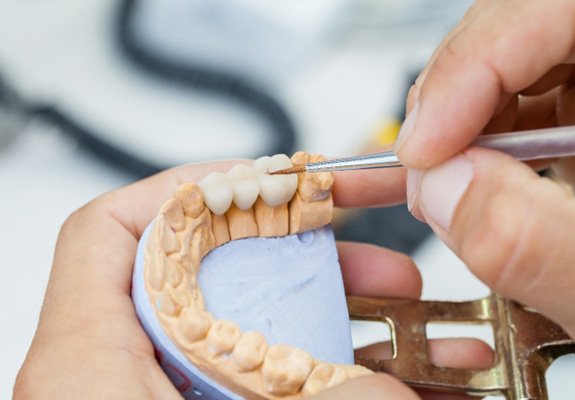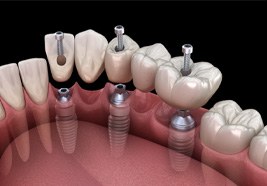Dental Bridges – Lewisville, TX
Custom-Crafted Bridges to Restore Smiles to Their Original Beauty

Missing several teeth in a row can have a very noticeable impact on your daily life, making it difficult to do basic tasks like eating and speaking. As a prominent concern among millions of Americans, missing teeth are one of the most common problems that we address here at Sehnert Precision Dentistry. We offer several trusted solutions to get your smile back in working order, including traditional and implant dental bridges in Lewisville. Call our office today to schedule a consultation and learn how our team can restore your missing teeth.
Why Choose Sehnert Precision Dentistry for Dental Bridges?
- Combine with Dental Implants for Lifelike Results
- Knowledgeable Dentist with 20+ Years of Experience
- Affordable In-House Membership Plan Available
What is a Dental Bridge?

Dental bridges are custom-designed restorations designed to replace anywhere from one to four missing teeth in a row. They’re comprised of two main parts: the crowns, which are attached to either end of the bridge to anchor it within the mouth, and the pontics, which are the free-standing replacement teeth located between the crowns. Once secured to the two existing teeth on either side of the gap in your smile, or to two dental implants, the bridge will act to close the space in your arch and restore your full row of teeth.
Types of Dental Bridges

There are two different types of bridges that you can choose from based on your budget, goals, and ideal treatment timeline. Dr. Phillip Sehnert will walk you through each of your options, helping you decipher the pros and cons of each so you can make the best choice for your smile.
Traditional Bridge

Traditional bridges are known as a more cost-effective solution, as they don’t require any type of surgery to place. The crowns on either side of the restoration will be secured to your existing teeth, and with good maintenance, traditional bridges can last for anywhere from five to 15 years.
Implant Bridge

Unlike traditional bridges, implant bridges are secured within the mouth by two dental implants, which are titanium posts that are surgically placed below the gumline and into the jawbone. This requires no alteration of your healthy natural teeth, and with good oral hygiene can last for 30 or more years.
The Benefits of Getting a Dental Bridge

Dental bridges offer a wide range of life-changing benefits that you’ll be able to enjoy, including:
- Ability to last for anywhere between five (traditional bridge) and 30 or more (implant bridge) years.
- Easy to maintain and care for.
- Can prevent surrounding teeth from shifting out of place to fill the gap in the smile.
- Improved eating and speaking abilities.
- Boosted confidence with a complete set of teeth.
Dental Bridges FAQs
Can You Take a Dental Bridge Out?
Dental bridges are designed to remain fixed in place for many years, so you should not be able to remove your appliance without the help of a qualified oral health professional such as Dr. Sehnert. While you may have heard of “removable bridges,” this is a misnomer used to refer to partial dentures. While partial dentures can be quite similar to dental bridges, they are designed to be removed by the patient at any time for oral hygiene purposes.
Is Getting a Dental Bridge Painful?
Dr. Sehnert will administer a suitable anesthetic to ensure that you feel no pain before preparing your teeth to receive a dental bridge. While this usually takes the form of a topical anesthetic, patients who need extra help staying still and calm throughout the process may benefit from receiving sedation treatment as well. After the bridge is placed, you can expect to experience dental sensitivity for several days. This can usually be addressed with over-the-counter pain medication, but contact our office in Lewisville if you experience worsening discomfort. Since bridges protect the gums from injuries and prevent the remaining teeth from drifting out of place, they can prevent discomfort by helping the patient avoid the oral health issues these cause. If you are receiving an implant bridge, your jaw will probably feel sore for a few days afterward, but you can minimize this discomfort by adhering to the detailed aftercare instructions we will provide.
How Long Should a Dental Bridge Last?
A dental bridge lasts between five and fifteen years on average depending on how well it is cared for and the material used to manufacture it. While metal bridges may last slightly longer than metal-free ones, the difference is often negligible. Devices replacing teeth in the back of the mouth may not last as long as those replacing the front teeth since they will endure more pressure during the chewing process. However, the most important factor for the longevity of your dental bridge is how well you take care of it by practicing excellent oral hygiene, keeping up with regular dental visits, and refraining from bad habits like smoking, grinding, nail-biting, and eating ice. Bridges supported by dental implants will probably last longer than traditional appliances, and while the restoration itself will eventually have to be replaced, the titanium pieces used to anchor it to the jawbone should be able to stay in great shape for decades if they receive excellent care.
How Many Teeth Can a Dental Bridge Replace?
A dental bridge can replace one to four consecutive missing teeth, but traditional bridges are usually used to replace only one or two. Longer bridges are less stable, so a device replacing two or three teeth may risk injury to the healthy teeth supporting it. However, dental implants may be able to safely support longer bridges since they are surgically placed in the jawbone for a superior hold.
